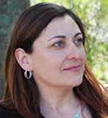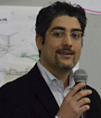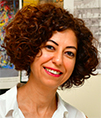(https://doi.org/10.55612/s-5002-064)

Danielle Allessio
is a researcher and educator at the University of Massachusetts Amherst, advancing learning technologies through data analysis and educational research. Her work focuses on intelligent tutoring systems, social-emotional learning, and virtual environments that enhance student engagement. As lecturer for the Learning, Media, & Technology MEd program, she teaches digital pedagogy, web design, and creative educational applications while fostering collaboration and innovative problem-solving. She bridges AI and education to create more personalized and accessible learning opportunities, supporting students and faculty in leveraging technology to transform educational practice.

Andrea Annus
is working as a junior research fellow and lecturer of andragogy at Tallinn University School of Educational Sciences. Her dissertation is focused on the implications that artificial intelligence has on the social dimension of learning spaces in higher education. She contributes to the field of adult education, research of adult teaching practices and international collaboration in both formal and non-formal education contexts.

Ivon Arroyo
her work focuses on developing intelligent learning systems that adapt math instruction for K–12 students by analyzing their skills, emotions, and thinking processes in real time. She also explores wearable and embodied learning tools—like mobile devices worn on the body—that promote active, hands-on math experiences. As director of the Advanced Learning Technologies Lab, she has earned numerous honors, including an NSF CAREER Award and a Fulbright Fellowship, recognizing her innovative work at the crossroads of education, technology, and cognitive science.

Blaženka Divjak
is a Full Professor of Mathematics and Scientific Advisor in Information Science at the University of Zagreb, Faculty of Organization and Informatics. She leads the Laboratory for Learning Analytics and Academic Analytics. Her research interests, besides mathematics, include learning analytics, learning design, e-learning, assessment, AI in education, and strategic decision-making in higher education. She has participated in more than 40 national and international projects, and currently coordinates the Erasmus+ project Innovating Learning Design in Higher Education and the Croatian Science Foundation project Trustworthy Learning Analytics and Artificial Intelligence for Meaningful Learning Design. She led the development of the BDP concept and tool (see: learning-design.eu). Professor Divjak served as Vice-Rector of the University of Zagreb (2010–2014) and as the Croatian Minister of Science and Education (2017–2020). During Croatia’s 2020 EU Council Presidency, she chaired the Council of Ministers for Education, Research, and Space. She is currently Vice-President of the Society for Learning Analytics Research (SoLAR). She has authored eight books and over 150 scientific and professional publications and is a frequent invited speaker at international conferences.

Sai Gattupalli
PhD, is a learning sciences researcher and education technology scholar at the University of Massachusetts Amherst. His work bridges culturally responsive computing, game-based learning, and AI-integrated educational systems, with a focus on equitable access to emerging technologies. He has led international research initiatives, contributed to computing and math education projects such as Wearable Learning, MathSpring and Usable Math, and presented globally on AI literacy and human-centered learning technologies.

Carlo Giovannella
Graduated in Physics, he worked long time in solid state physics as an expert of complex systems. Nowadays can be considered a Designer for the experience: expert in the technology-enhanced learning, interaction design, computer-mediated communication, design and management of processes, process and product innovation, ecosystems monitoring and benchmarking. From 2015 till 2023 has been the President of ASLERD (Association for Smart Learning Ecosystems and Regional Development); at present is member of the Executive Committee of the association as Past-President. It has been the Scientific Director of the Creative Industries Area at the Consorzio Roma Ricerche from 2013 till 2016. He is member of the Dept. of History, Cultural Heritage, Education & Society of the University of Rome Tor Vergata, where he has chaired for more than 25 years the ISIM_garage (Interfaces and Multimodal Interactive Systems), a research lab devoted to design and development of TEL-environments, tools and methods for education, interaction design, and more. He is the Editor in Chief of the journal Interaction Design and Architecture (IxD&A) since 2005. It has been involved for shorter periods in the editorial board of JeLKS and IJDLDC and it is involved in the scientific board of ET&S Journal.

Çiğdem Karabağ
completed her undergraduate education in the Department of Architecture at Eastern Mediterranean University in 1999. Starting her professional career in the private sector in 1997, she undertook roles in design, project management, implementation, and competition projects. In 2021, she obtained a master’s degree in Architectural Design Program from Istanbul Kultur University. Since 2022, she has been pursuing her PhD studies at the same university and contributing as a visiting instructor in interior design studios. Her research interests include residential culture and consumption, urban studies, memory and space, visual culture, and speculative fiction.

Antonina Korepanova
is a junior research fellow and a PhD student at Baltic Film Media and Arts school, Tallinn University.

Francesca Mattioli
PhD, Researcher at the Department of Design at Politecnico di Milano, she researches design learning and teaching practices through collaborative projects in academic contexts characterised by cultural plurality. She collaborates as a researcher in the Doctoral Courses System 4 Design project, co-funded by the European Union’s Erasmus+ program to develop an International Excellence Network among six doctoral programs in Design. Since 2023 she has been part of the National Recovery and Resilience Plan (PNRR), in the “Made in Italy Circolare e Sostenibile (MICS)” project.

Antonio Opromolla
ssistant Professor at the Human Studies Department of University of L’Aquila. He conducts research in sociology of communication and cultural processes using participatory, qualitative, and quantitative methods. Focus areas include institutional and risk communication, digital urban dynamics, social innovation, gender and generational media issues, and citizen journalism.

Kai Pata
has MA in Biology and Chemistry teaching, MSc in Science education from The University of Tartu, Estonia and PhD in Education from The Turku University, Finland. She is the professor of adult and informal education in Tallinn University, Estonia. Her research is on adult and informal education, citizen science and educational technology in different learning situations.

Valerio Perna
holds a PhD in Architectural Design from Sapienza – University of Rome. His research investigates the implications of play in contemporary architectural practice. He is a lecturer in Architectural Design & Information Technology at the Department of Architecture at EPOKA University in Tirana. He has been the winner and coordinator of international research projects, including the Creative Europe project – SPORES and the Innovation Challenge (organized by the German international cooperation agency GIZ and the Swedish agency SIDA), through which he established the first Makerspace/FabLab in Albania. He has participated in national and international conferences and symposia as a speaker and moderator in countries such as Sweden, Iran, Kosovo, and others, and has conducted lectures, university courses, seminars, and workshops both in Italy and abroad. Alongside his academic work, he also engages in professional practice in both Italy and Albania.

Halliki Põlda
is working as an associate professor and lecturer of lifelong learning at Tallinn University, School of Educational Sciences. Her practice and research interests are related to educational communication, lifelong learning and non-formal education. Her teaching methods are inspired by non-formal learning philosophy. Halliki defended her doctoral thesis in 2019 and the purpose of the thesis was to establish how the well-known social phenomenon – giftedness – is construed in public communication functioning in society. Her main principle based on the study is that society should support the idea that giftedness can be developed, and it is inherent to everyone.

Giuseppe Roccasalva
since 2003 he have been research advisor at Polytechnic of Turin – Faculty of Architecture/Urban studies where he worked and developed part of his experience. He has been consultant for two research centre, SiTI (Higher Institute on Territorial Systems for Innovation) and LAQ- Tip (High Quality Lab- Territorial Integrated Projects) where he developed urban design projects and multi-criteria analyses commissioned by private/public stakeholders. He has contributed to multidisciplinary researches projects and disseminated publications on simulation, assessment tools and processes of co-design. In addition, he is a chartered Architect and Engineer, professional consultant for different public Authorities and municipalities dealing with environmental and landscape assessment-design. He was appointed as research manager for supporting the development of Eu-funded projects and He is expert evaluator of solar impulse foundation for sustainable concepts and prototypes. He had working and formative experience with Swedish Universities (CTH and KTH), where he was also selected for internship by Goteborg’s Town Planning Office (SBK) and as advisor for KTH/Nordregio and other research bodies in the field of European grants.

Eugenia Rosina
is a Marie Sk?odowska-Curie PhD student at Moholy-Nagy University within the CoDesign4Transitions Network. Her research explores the interplay of design and narrative as facilitators of social innovation and identity construction, as well as intermediaries between human and non-human entities. As part of the Master of European Design program at Politecnico di Milano, She holds degrees in Industrial Design and Integrated Product Design with additional studies at Konstfack University and Aalto University. Her expertise includes strategic communication and innovation-driven design for engagement and social impact.

Barbi Svetec
is a research and teaching assistant and an information science PhD student at the University of Zagreb, Faculty of Organization and Informatics. Her areas of research interest are related to digital education, especially learning design, innovative approaches to teaching and learning, learning analytics and AI in education.

İlke Tekin
is an Assistant Professor at Mu?la S?tk? Koçman University in Turkey. Following her bachelor at Anadolu University, Department of Architecture (Eskisehir, Turkey, 2002), she received her Master of Science degree from Istanbul Technical University (ITU), Department of Architecture (Istanbul, Turkey, 2005). She has received her doctoral degree from the same university (ITU, 2013) with her dissertation titled “Constructing Reinforced Concrete in Turkey After the Second World War”. Her current research interests include modernization, building technology and urban history, concrete and building technology innovations, visual culture and architectural representation, urban transformation.

Mattia Thibault
is a Professor in Translation in the Creative Industries at Tampere University and has a PhD in Semiotics and Media (Turin University). His research interests include semiotics and translation, extended realities, speculative research, and playfulness in the built environment (real and digital). He is the leader of the InterReality Research Group which focuses on the relations between different “virtual” spaces (digital or possible) and their connections with the “real” world. He is PI of the projects InterReal (ERC-StG), NEXR (Business Finland Co-Research) and Mobility Mindshift (funded by Net Zero Cities, EU).

Terje Väljataga
is a Senior Researcher in the Centre of Excellence in Educational Innovation at Tallinn University (Estonia). Terje has been involved in various educational research and development projects both local and international since 2004. Currently she coordinates Horizon2020 project SEIS – Scaling up educational innovation in schools. Her research interests focus on integrated learning designs, orchestration and teacher support in outdoor mobile learning settings as well as students’ transformative experiences and science capital.

Lung-Hsiang Wong
is a Senior Education Research Scientist and the Co-Program Director of “Learning Sciences and Innovations” at the Centre for Research in Pedagogy and Practice, National Institute of Education, Nanyang Technological University, Singapore. He is also an Adjunct Professor of State University of Malang, Indonesia. His research interests encompass mobile learning, seamless learning, computer-supported collaborative learning, computer-assisted language learning, AI in education, and teachers’ professional development. He was named the APSCE Distinguished Researcher Award in 2015 and has won nine Best/Outstanding Paper Awards at various conferences. He is listed among top-2% scientists worldwide by a study conducted by Stanford University in 2022. He is a Past-President of the Asia-Pacific Society for Computers in Education and a Managing Editor of the SSCI-indexed Asia-Pacific Journal of Education.

Beverly Woolf
Ph.D., Ed.D., is a Research Professor in the College of Information and Computer Sciences, UMass-Amherst. Her team has worked with hundreds of students and dozens of teachers to evaluate online K12 teaching platforms. They have developed tutors for education and industry and in a variety of disciplines (e.g., chemistry, psychology, and mathematics). She published the book Building Intelligent Interactive Tutors, wrote over 250 articles and was lead author on the NSF report Roadmap to Education Technology in which forty experts and visionaries identified the next big computing ideas for education. She is a Fellow of the Association for the Advancement of Artificial Intelligence (AAAI) and served as PI on numerous NSF and U.S. Dept. of Education awards.

Boming Zhang
is a fifth-year PhD student in Computer Science at the University of Massachusetts Amherst, specializing in AI education. His recent projects include applying reinforcement learning to problem recommendations and exploring script-based natural language processing. Boming has presented his work at EDULEARN25. He is passionate about teaching at all levels, from middle school summer camps to graduate-level computer science courses, always integrating the latest research into his practice. Boming aims to leverage his hands-on teaching experience to inform and enhance his research perspective.
